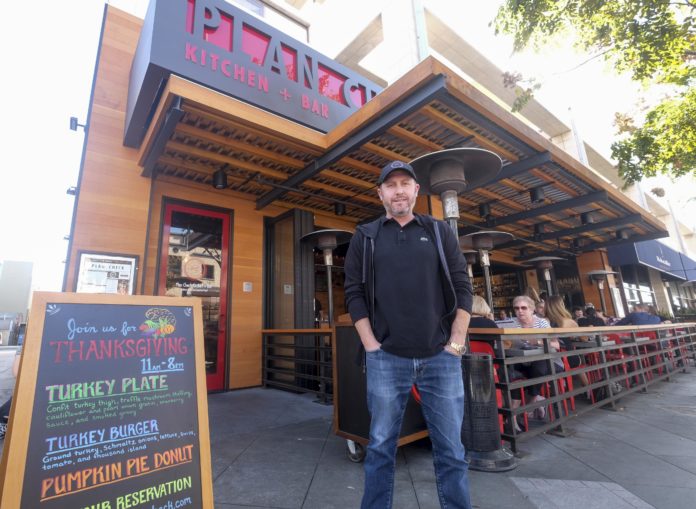Terry Heller, founder of sit-down burger joint Plan Check Kitchen + Bar, has never been to Dubai, but he’s planning on opening his first restaurant outside Southern California in the United Arab Emirates city next year.
“There’s a lot of growth out there,” said Heller. “There’s a huge demand, a lot of new hot opportunities.”
Plan Check is among a growing group of L.A. restaurant businesses expanding to Dubai and elsewhere in the Middle East through licensing agreements with local operators. These companies are being lured by high demand for American brands that offers new revenue streams and brand exposure with little upfront investment.
“Dubai and the Middle East have become a destination for brands looking to move globally,” said Darren Tristano, president of food and beverage industry research firm Technomic Inc.
Heller said he wanted to expand because it would allow the company to grow more in the United States and generate revenue.
“The strategy is to open up in Dubai and expand from there,” Heller said.
Heller opened Plan Check, his first restaurant after a career as a real estate developer, in the Sawtelle area in 2012. His twists on traditional American comfort food, such as ketchup leather (dehydrated ketchup to keep buns dry), soon brought offers from international partners, but Heller didn’t feel ready to expand.
After opening three more regional locations, bringing in some private investors, and beefing up his corporate staffing, he said yes when Legendary Brands Advisors, a company based in New York and Dubai that specializes in bringing Western brands to the Middle East, approached him a year ago.
“These guys were the first up to bat,” said Heller. “I just really liked them, connected with them.”
Michael Schmitt, a vice president at Legendary Brands, said things like ketchup leather made Plan Check stand out.
“We’re always on the lookout for emerging brands with enough experience and operations history so that they are stable enough to support an international partner licensee, but they’re nimble and a little different,” he said.
Big in L.A.
The first wave of American restaurateurs targeting the Middle East came in the early 2000s, but the recession halted those plans, according to Steven Wolff, an attorney at Century City law firm Rosenfeld Wolff & Klein who has represented Wolfgang Puck in worldwide licensing agreements since the 1980s, including for Cut, his restaurant with a branch in Bahrain.
With the recovery, those efforts are back on track in the member countries of the Gulf Cooperation Council, a regional government and economic agency that includes the UAE.
“Restaurants saw a surge beginning three to five years ago as the food scene in GCC, led by Dubai, really exploded,” said Schmitt, who added that brands with recognition and equity in Los Angeles tend to transfer well to the Middle East.
Another contributor to the area’s position as a leading exporter of restaurant concepts to the Middle East is its place as a popular tourist destination.
“The higher-ups, the royal families, who are doing developments, know that people travel and have homes in L.A.,” said Lee Maen, a founding partner of Innovative Dining Group, owner of BOA Steakhouse and Sushi Roku.
IDG first expanded to the UAE, where it now has four restaurants, in 2014 after being approached by a development company affiliated with the government.
Another player in the region is Disruptive Restaurant Group, a subsidiary of L.A.-based hospitality group SBE, which has opened two Katsuya sushi restaurants in the Middle East and plans to open six more.
Dubai draw
Dubai’s status as an international capital makes it easier and more attractive for outside brands to come in.
“Dubai is a center for leisure and entertainment, where everyone goes to have fun and enjoy,” said Maen. “It’s also a place where you can have alcohol.”
The Dubai International Financial Center, a 110-acre area with its own laws and regulations, was set up in 2004 to bring in foreign business.
“The government there has gone out of its way to make the city friendly to tourism and expatriates,” said Schmitt.
Almost 90 percent of the United Arab Emirates’ population of more than 9 million are expatriates.
“Not only are there customers with a high level of disposable income, there is exposure to millions of tourists and expats coming through Dubai, bringing knowledge of your brand back domestically,” said Schmitt.
The international population and Dubai’s diversified economy, which includes finance and real estate, has kept the city more insulated from the global oil slowdown that has affected its neighbors.
Licensing deals
American restaurants expanding to the Middle East typically sign five- to 10-year licensing agreements with a local partner who manages day-to-day operations.
“We provide the training, the design, the recipes,” said Maen. “We give them a package of the restaurant to open.”
The partner pays a one-time licensing fee, usually between $150,000 and $350,000 for more upscale restaurants, said Maen. Restaurant operators pay an annual base fee or between 4 percent to 6 percent of gross sales, whichever is greater. Sales are generally comparable with the annual $1,000 a square foot that Innovative’s restaurants do in America.
Hotels are popular partners because they have the management infrastructure and a physical space in place. Some already have relationships with restaurateurs such as the Four Seasons has with Puck.
“Properties are trying to distinguish themselves from other hotel properties,” said Wolff. “A well-known chef comes with his own brand and marketing.”
Licensing has its pros and cons, and Maen said he doesn’t use the same tactic in the United States.
“The good thing about a licensing deal is it opens up new markets that are too far for us to reach,” he said. “It requires low to no cost capital. The risk is your brand and time.”

